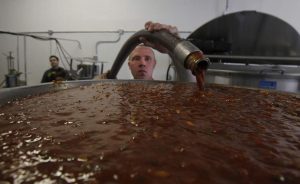A Taste for Salsa
By Ilene Aleshire
The Register-Guard
May 5, 2013
For De Casa Fine Foods, whose fortunes were founded on salsa, today — May 5 — is the equivalent of department stores’ money-making Black Friday.
“Cinco de Mayo is our single biggest day of the year for salsa sales, even bigger than Super Bowl and 4th of July,” said Lindsay Stubblefield, operations manager, of the family owned Eugene food maker. “Our sales for Cinco de Mayo week are 40 percent higher than our normal weekly average.”

Colt Crawford transfers salsa to a hopper for packaging at De Casa Fine Foods in West Eugene. (Kevin Clark/The Register-Guard)
The Hispanic food market is a $9.2 billion market annually nationwide, and growing, according to a recent report by Mintel Group, a London-based international market research firm. Sales increased by 9.2 percent from 2007 to 2012, with most of the growth in the early part of the period, according to Mintel. It is projecting the market will grow 13.9 percent from 2012 to 2017 — good news for the Lane County companies that produce Hispanic foods.
De Casa President Stan Stubblefield said his company experienced “three years of tremendous growth” with sales rising an average of 30 percent a year before things leveled off in 2012, giving the company a chance to catch its collective breath. De Casa, which employs eight people, does not disclose revenues.
Stubblefield cites several factors — some global and some specific to his company — as driving the growth.
First, salsa has become more familiar and accepted by Americans in general, many of whom have grown up with it, he said. “Salsa overtook ketchup as the number two condiment in the country,” Stubblefield said. “Mayonnaise is still number one.”
Second, salsa is perceived by a number of people as being healthier than some other types of dips, he said. Third, the majority of his products are organic, particularly important in the Pacific Northwest, and fourth, the company is based in Eugene, which matters a lot to local consumers, he said.
Stubblefield bought the company in 2002 and spent the first year strictly on production, he said, “getting the system down, making sure the products were consistent, making sure they were made correctly.”
He applied his training as an industrial engineer — he once worked for UPS, a company famous for increasing efficiency by paying attention to detail — to the salsa company, figuring out the best way to do everything, including transporting the finished product to stores from Ashland to Vancouver, Wash., Bend to the coast, including Market of Choice and Whole Foods.
“Costs are important, not only for (the company’s) bottom line but for the customer,” Stubblefield said, adding that keeping prices to consumers low results in higher sales volume.
“We watch costs not just weekly but daily,” he said. “We look at all suppliers. We like to have suppliers that can supply us in bulk. Buying in bulk helps cut transportation costs. We watch our delivery routes. If we can save a mile we’ll change a route.”
Big Growth
Soon after he acquired the company, he started to diversify, buying a local firm in 2003 that made hummus in space it sublet from De Casa. De Casa also began producing other bean dips, artichoke dips and marinades.
In 2006, the company repackaged its Soringhart Hummus line, increasing the size of the container and changing the labels to give them a new, fresher look. Re-packaging can be risky, Stubblefield said. It can boost sales and attract new customers if people like the new packaging, he said, or it can kill sales if people respond negatively.
Stubblefield had a local design company come up with three options and field tested them before selecting one. The end result was increased hummus sales, he said.
In 2008 the company moved into organics. “That was the start of our big growth,” Stubblefield said.
He had hoped to go organic earlier, but finding all the ingredients he needed proved to be a little more difficult than he anticipated. “Garlic was one of the hardest,” Stubblefield said, “and some of the dried spices.”
In order to be certified organic, the spices could not be irradiated to kill bacteria, he said, so he had to find a source of spices that were free from bacteria but not irradiated. He persevered and, today, the majority of the company’s products are certified organic. All of the salsas and hummus are 100 percent organic. The bean dips are 95 percent organic and the company is moving towards 100 percent, Lindsay Stubblefield said.
In 2009, the parent company of a major competitor, Emerald Valley Kitchen, closed its Eugene plant and moved production of Emerald Valley salsa and bean dips to Kent, Wash. Local residents did not take it well. Stubblefield said De Casa got another big bump in sales as local residents switched their patronage to De Casa, which remained firmly planted in West Eugene.
In 2010, when the company took over its Portland distribution, it again increased sales.
Carmen’s Chips
De Casa also teamed up with another Eugene company, Carmen’s Chips, and now distributes Carmen’s products in Oregon along with its own. It was a natural fit, Stubblefield and Carmen’s owner David Martinez said.
Carmen’s started out in the mid-1980s, Martinez said, and concentrates on doing one thing and doing it very well — making chips. The only ingredients in the chips are masa (corn flour), oil, water and salt — and the skill and experience of Carmen’s employees, according to the company’s website.
No GMO (genetically modified ingredients) appear in Carmen’s chips, Martinez said. The company is still buying its raw materials from the same mills in California that it began with, he added.
Like Stubblefield, Martinez said that he has seen growth in sales, driven by the increasing popularity of Hispanic foods among the overall population.
Nacho’s
Not all of the Eugene-Springfield area’s Hispanic food producers started out as manufacturers.
Cary Drinkwater began by purchasing a Eugene restaurant, Nacho’s, nine years ago.
Manufacturing a line of products such as salsa to sell through grocery stores was part of his plan from the beginning, he said, but it took him a few years to get there.
He had previously worked for Taco Time International, at that time based in Eugene, including as director of purchasing and in research and development, he said. “I was always looking at different salsa and sauces.” When Taco Time was sold to Arizona-based Kahala Corp. in 2003, Drinkwater said, he was offered the opportunity to move to Phoenix but decided to remain in Oregon. Not long after, Nacho’s was put up for sale. “I had been eating at Nacho’s for years,” Drinkwater said. With decades of experience in the food industry, he figured he could not only make a go of the business, he could grow it. So, in 2004 he bought Nacho’s from its founder, the Lesh family, who had previously sold their dressing and mixes in stores in the Northwest.
For Drinkwater, adding a retail line of bottled salsas, pico de gallo and marinade/dressing/sauce didn’t happen quite as quickly as he had hoped. But in 2009, he found himself sitting down with representatives of the Eugene-based Market of Choice grocery store chain — “I felt like they were really great about supporting local businesses” — and presenting a line of seven products for their consideration.
“They chose four at the first meeting,” Drinkwater said, “They told me they wanted the product the next day.” Drinkwater said that might be a little sooner than he could deliver but set to work and soon had a line of products ready to go, using a local company to make the containers and another local company to make the labels.
“We went into one store in Eugene in the spring,” he said. “A couple of weeks later we went into another three. Now we’re in all their stores.” The products also are in local Albertson’s, Ray’s Food Place, New Frontier Market, Friendly Street Market and Wynant’s Family Health Foods.
Today, the retail line — produced in the restaurant’s kitchen — brings in about 15 percent of the company’s sales, he said.
Drinkwater is in a store somewhere every Friday, offering samples and handing out coupons for the restaurant, cross-promoting the two business ventures. “The coupons don’t have an expiration date,” he said. “That’s deliberate. I don’t want to give someone an excuse for not taking one. And I don’t care if they come in three months or a year or three years.” Once they come, he said, he figures he’s got them as future customers for the restaurant and the line of bottled products.
Plaza Latina
Sam Recinos also got into food manufacturing via retail, but it was more an accidental progression than a deliberate one.
Recinos owns Plaza Latina Super Market in Eugene, a grocery with a “hot deli” serving fresh Mexican food.
In the beginning, Recinos began making products for sale in the store. “We make our own tortillas, our own tortilla chips and salsa — we also buy a little bit from other companies — and our own pastries,” he said.
Before long, Recinos said, other small markets around the area, including as far away as Roseburg and the coast, began asking to buy the products he was making to sell in their own stores.
Recinos has seen growing demand from non-Hispanic consumers, as well as Hispanics, for the food he is making and selling. Partly, he said, he thinks people are gravitating more toward freshly made products that are local, which they perceive as healthier. And, partly, he said, Americans have learned more about Hispanic foods as they have become more traveled and seek them out.
“A lot of (local) people have traveled to Mexico or South America and they’ve gotten used to foods there,” he said.
Local producers said they don’t see the demand for Mexican food items decreasing any time soon. Some, like Ramirez and Stubblefield, are looking at opportunities for further growth and expansion.
“I see the overall Mexican/Hispanic food (market) growing,” Stubblefield said. “And, as long as I see tortilla sales growing, chip sales growing, salsa will continue to grow.”
The original article by The Register-Guard can be found here.
